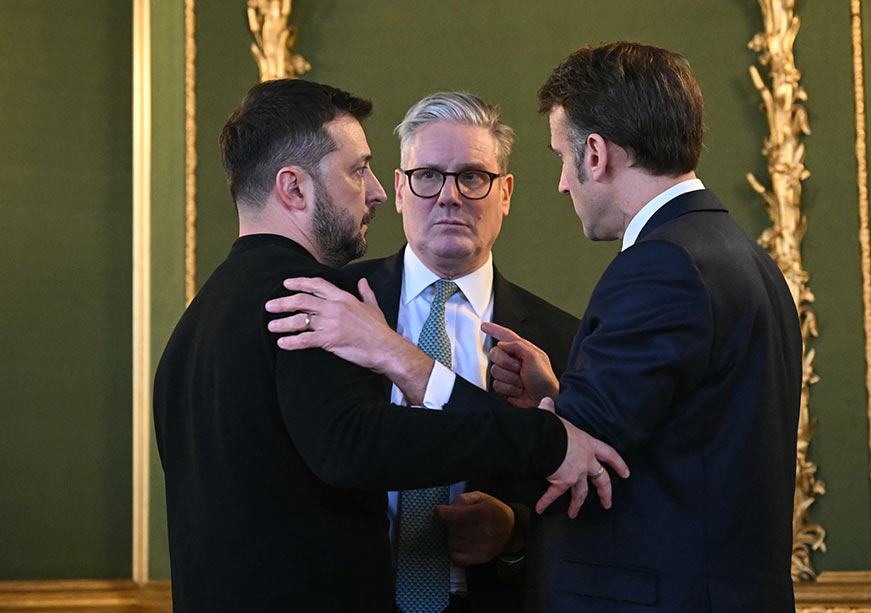-
CENTRES
Progammes & Centres
Location

The tense Trump-Zelensky spat in the Oval Office in full media glare was an inflection point, wakeup call, a jolt and a lesson in diplomacy– all rolled into one. While the jury is out on the impact of the unprecedented public show on the second Trump administration’s domestic ratings, the repercussions externally are more obvious. In quick succession, Vice President J.D. Vance’s Munich Security Conference speech and the public reprimand of Zelensky have set other countries scrambling for a Trump strategy – especially in its second avatar. Yet, the broad arc of the US approach to trans-Atlantic security specifically and the liberal institutional order generally have become clearer. America is scaling back its old order commitments and repositioning itself based on a policy which has been hitherto untested with its allies – a stick only economic policy to enforce shoring up of security and economic commitments by its allies, partners and friends alike.
Under the second Trump administration the domestic impulses guiding US policy are perhaps more pronounced than under any presidency in the past. The Trump 2.0 administration also inherits a stronger US economy than before. Besides, in Trump the US also has the most mercantile president ever. The cumulative impact of all these is a policy where diplomacy looks like an economic cudgel and the approach to international affairs from Washington is compellingly Thucydidean: “The strong do what they can and the weak suffer what they must.”
Under the second Trump administration the domestic impulses guiding US policy are perhaps more pronounced than under any presidency in the past.
The darkest and longest shadows of the rapid policy twists in Washington will be cast on Europe and the future of trans-Atlantic security. As was evident, the Trump administration is unlikely to commit to a security framework in Europe where it pits Washington against Moscow. In fact, the Trump administration is demonstrably against security commitments abroad, to the extent that its age old commitments under NATO now hangs in the balance. What is certain, that any road to getting Washington’s security commitments is likely to involve an large economic component. As such, the semblance of an offer that the Trump administration has put on the table for Ukraine as a guarantee against Moscow is a Mineral Deal without any explicit security guarantees. Clearly, this approach may not be acceptable to most countries, as has been the case in the case of Ukraine.
An immediate repercussion of Washington’s security recoil has been the beginning of an almost pan-European consensus on the need to step up and fill the potential gaps which could emerge as a result. Most European leaders appeared bound in a consensus to carve a new security assurance for Ukraine, except this time without the US. The three leading powers of Europe, France, Germany and the U.K along with the EU as a bloc have all depicted existential urgency to European security where the black might have to take charge of not just its own security but also negotiations on part of Ukraine. Two meetings held recently, one in February in Paris which was convened by France after the Munich Security Conference and the other more recently which was convened by the U.K in the aftermath the Oval Office showdown between Trump, Vance and Zelensky attest to a fork in the road moment for Europe. While these efforts might be aptly realistic way to deal with a Trump administration which is unfazed about how others are affected, attempts to redo European security order will be tempered by two stark realisations. First, the American hard power and its sophisticated systems such as aerial defence remain indispensable for European security in the near term. Second, the path to a complete security independence from the US is a long one for Europe and may require extraordinary economic, political and security reorientation not just on the part of individual countries but the EU as a whole. Some consider this as a chimera while others still feel Europe needed this inflection point.
The three leading powers of Europe, France, Germany and the U.K along with the EU as a bloc have all depicted existential urgency to European security where the black might have to take charge of not just its own security but also negotiations on part of Ukraine.
The arm-twisting policies from the US will soon reverberate beyond its European allies. How countries adjust, recalibrate and readjust will depend on their economic and security needs and ability to reposition their dependence on Washington. As the Trump administration looks at the Indo-Pacific and its primary challenge China, it will be Asia and the global South’s turn to navigate an economically aggressive Trump administration. Amidst this flux and an increasingly hard bargaining from the US, India secured a workable path to a Bilateral Trade Agreement with a deadline later this year. As a country which has a significant trade surplus with the US, it could serve India well to mix conciliations with red lines.
This commentary originally appeared in The Economic Times.
The views expressed above belong to the author(s). ORF research and analyses now available on Telegram! Click here to access our curated content — blogs, longforms and interviews.

Professor Harsh V. Pant is Vice President – Studies and Foreign Policy at Observer Research Foundation, New Delhi. He is a Professor of International Relations ...
Read More +
Vivek Mishra is Deputy Director – Strategic Studies Programme at the Observer Research Foundation. His work focuses on US foreign policy, domestic politics in the US, ...
Read More +